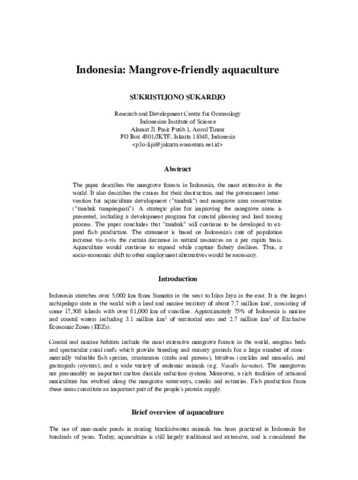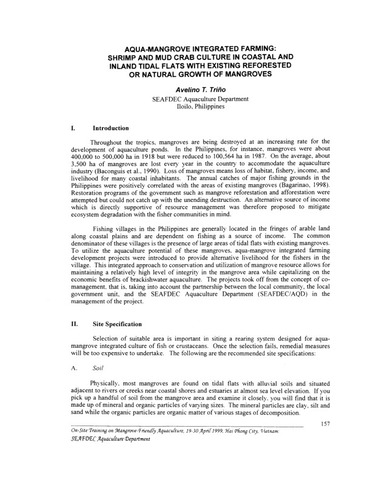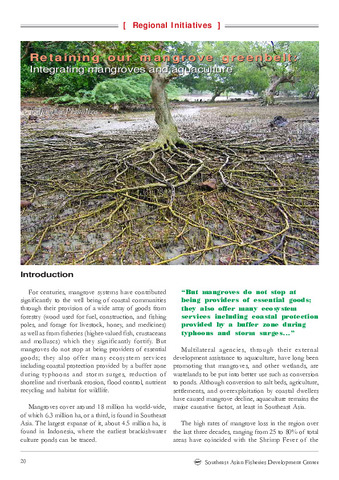Indonesia: Mangrove-friendly aquaculture
- Global styles
- MLA
- Vancouver
- Elsevier - Harvard
- APA
- Help
Share
抄録
The paper describes the mangrove forests in Indonesia, the most extensive in the world. It also describes the causes for their destruction, and the government intervention for aquaculture development ("tambak") and mangrove area conservation ("tambak tumpangsari"). A strategic plan for improving the mangrove areas is presented, including a development program for coastal planning and land zoning process. The paper concludes that "tambak" will continue to be developed to expand fish production. The statement is based on Indonesia's rate of population increase vis-a-vis the certain decrease in natural resources on a per capita basis. Aquaculture would continue to expand while capture fishery declines. Thus, a socio-economic shift to other employment alternatives would be necessary.
Suggested Citation
Sukardjo, S. (2000). Indonesia: mangrove-friendly aquaculture. In J. H. Primavera, L. M. B. Garcia, M. T. Castaños, & M. B. Surtida (Eds.), Mangrove-Friendly Aquaculture : Proceedings of the Workshop on Mangrove-Friendly Aquaculture organized by the SEAFDEC Aquaculture Department, January 11-15, 1999, Iloilo City, Philippines (pp. 105–140). Tigbauan, Iloilo, Philippines: Southeast Asian Fisheries Development Center, Aquaculture Department.
Type
Conference paperISBN
9718511423Collections
Related items
Showing items related by title, author, creator and subject.
-
Aqua-mangrove integrated farming: Shrimp and mud crab culture in coastal and inland tidal flats with existing reforested or natural growth of mangroves
Triño, Avelino T. (Aquaculture Department, Southeast Asian Fisheries Development Center, 2000)Throughout the tropics, mangroves are being destroyed at an increasing rate for the development of aquaculture ponds. In the Philippines, for instance, mangroves were about 400,000 to 500,000 ha in 1918 but were reduced ... -
Technologies in Mangrove-Friendly Aquaculture. Final Report of and Papers Presented to the On-Site Training on Mangrove-Friendly Aquaculture, Hai Phong City, Socialist Republic of Vietnam, 19-30 April 1999
Southeast Asian Fisheries Development Center, Aquaculture Department; Tadokoro, Yasuho; Sulit, Virgilia T.; Abastillas, Rosario B. (Aquaculture Department, Southeast Asian Fisheries Development Center, 2000)This document contains the final report of and papers presented as lecture materials, to the On-Site Training on Mangrove-Friendly Aquaculture held in Hai Phong City, Socialist Republic of Vietnam from 19 to 30 April 1999. ... -
Retaining our mangrove greenbelt: Integrating mangroves and aquaculture
Although multilateral agencies in Southeast Asia have long been promoting that mangroves, and other wetlands, are wastelands to be put into better use, such as conversion to ponds. However, there is a need for Mangrove ...







